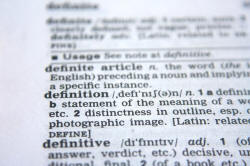CELTA Syllabus
Topic 2: Language analysis and awareness
 |
... language learning is essentially learning how grammar functions in the achievement of meaning and it is a mistake to suppose otherwise. .... A communicative approach does not involve the rejection of grammar. On the contrary, it involves a recognition of its central mediating role in the use of and learning of language. (Widdowson, 1990: 97/8) |
Each section of this guide is brief and contains links to guides
elsewhere on this site. Following those guides will prepare
you well.
You should look for the areas of language analysis which are
particularly important to you (because, e.g., you are teaching them
tomorrow). To do that, go to the initial plus training section
or search for what you want by using this link:
search the whole
ELT
Concourse
site.
Searching from there may take you to some of the
more advanced language analysis guides. But why not?
Native and non-native speakers of English
- If you are a native speaker of English:
You actually 'know' all the grammar in one sense, insofar as you can speak the language and have no trouble forming grammatically correct utterances (usually). What you probably don't have is what is called declarative knowledge and that is what prevents you from being able clearly to explain grammar to learners or to plan and teach the grammar input they need.
In Britain and many other English-speaking countries grammar is not taught thoroughly or even at all in most schools. The spin-off from this is that many teachers (and some teacher trainers) know embarrassingly little about the grammar of their own or anyone else's language. - If you are a non-native speaker of English:
You have a distinct advantage. You know the grammar pretty thoroughly and probably know lots of terminology to talk about it as well. What you need to be careful not to do is visit on your students the awful things that happened to you. Swan puts it this way:
Many foreign-language teachers spent a good deal of time when younger learning about tense and aspect, the use of articles, relative clauses and the like; they naturally feel that these things matter a good deal and must be incorporated in their own teaching. In this way, the tendency of an earlier generation to overvalue grammar can be perpetuated. (Swan, 2002)
 |
Why do I need to analyse the language? |
 |
 |
Task 1:
Well, why do you? Click here when you have made a note of some reasons you should be able to analyse and teach the systems of English. |
- Dealing with error
- You can speak the language, of course, and you can immediately spot when an utterance is malformed or grammatically flawed. However, especially if you are a native speaker, you may be at a loss to know what exactly has gone wrong and the best way of explaining what's right. You need to be able to analyse language on the hoof, not just in your study.
- Teaching formal structures
- There are times when learners of English (most of them) need
to learn how a structure works. There are two reasons for
this:
a) As Swan puts it: "Knowing how to build and use certain structures makes it possible to communicate common types of meaning successfully. Without these structures, it is difficult to make comprehensible sentences. We must, therefore, try to identify these structures and teach them well." That mirrors the view of Widdowson, above.
b) Swan again: "In some social contexts, serious deviance from native-speaker norms can hinder integration and excite prejudice – a person who speaks ‘badly’ may not be taken seriously, or may be considered uneducated or stupid. Students may, therefore, want or need a higher level of grammatical correctness than is required for mere comprehensibility." - Learner expectations
- Most adult learners are aware that they need grammar to communicate and will neither trust nor respect teachers who can't teach it, correct it and explain it or don't seem to know their own subject thoroughly.
 |
Where do I start? |
If you have never analysed language before, there are two short courses and a reference section on this site to help:
| A Basic Training Course | This is a pre-CELTA course and this part will introduce you to some key grammar analysis. |
| A short Language Analysis Course | This course covers the elements of pronunciation, words, phrases, clauses, sentences and text structures. |
| A Simple English Grammar | This is written for elementary students and will help you to explain simply some grammatical ideas in the classroom. |
This is what this area includes. Click on the area which
interests you for more. (Click on
![]() to return.)
to return.)
 |
Basic concepts and terminology |
The primary distinction to get clear before you can begin to
learn about the language (any language, in fact) is that between
form and function.
To do that, follow
the
guide to form and function and then close that page to come back
here.
OK. Now you have all that clear, you can get on. There are two choices for you:
- Go to guides to terminology on this site now and try to
familiarise yourself with the concepts and terms we need
(it's called metalanguage, incidentally) to talk about
language systems. To do that, open any of these
guides. They all open in a new tab so simply
close them to come back.
Guide Content terminology in ELT This covers a basic range of different kinds of terms to describe the language and teaching the language. grammar glossary This is a reference guide for CELTA. phonology terminology This covers the essentials of the language we use to talk about pronunciation. other glossaries For a list of all the glossaries on this site. English tenses This gives you a summary of the names of the tenses in English and what they do. the sentence This explains the types of sentences that exist in English and what they are called. word class essentials This guide cover what you need to know about the different sorts of words in English (nouns, adjectives, pronouns etc.). subjects and objects This will teach you about how English deals with the important noun phrases which make up part of almost all sentences. - The second alternative is just to go on and try to absorb the terminology as you work through the guides of your choice. That's the way most CELTA courses expect you to learn the terminology and understand the concepts.
 |
Grammar and Lexis |
Click here to go to a basic guide to grammar and learn some
important concepts and terms.
Click here to go to a basic guide to lexis and learn some
important concepts and terms.
Then close the guides and click here to go to the initial plus training index where you can select the area of grammar or lexis which interests you (or which you are teaching tomorrow) and follow the relevant guides there.
If you don't know where to start:
- For grammar, you need to look at the sections on verbs and the sentences:
- go first to the section in the initial plus index concerned with verbs and tenses and then look at the section on what are called modal auxiliary verbs. These two areas are central to understanding how English grammar works.
- For lexis, the section you want is called Words and vocabulary:
- start with the guide to word class. Until you understand word class, you can't do anything useful. Then look at the guides to different kinds of words: nouns, adjectives, adverbs, prepositions etc.
 |
 |
 |
Phonology |
| 'eee' /iː/ | aah /ɑː/ | sh /ʃ/ |
Phonology is the study of the sounds of a particular language (not all languages; that's phonetics), in our case, English.
There is
a
guide to the basic concepts in phonology that you need to know
about but you would be well advised to follow
the mini-course on this site to help you learn to transcribe the
sounds of English accurately. It will take a bit of practice but
will pay off handsomely in the classroom (and contribute to the A
grade you going to get for the CELTA course).
There are pronunciation guides in
the initial-plus
section of the site that will help and there are some more technical guides, too, in
the
in-service training section.
 |
Similarities and differences between languages |
Many people have made long, honourable careers out of the study
of what is known as comparative linguistics.
You don't need to do that but you should have a basic understanding
of how English works and how it is similar to or different from your
learners' language(s).
This site goes to some lengths to consider other languages in the
guide sections and there is also a useful introduction in the
sections
on word order and
teaching the article system.
Alternatively,
search the
site to see what is said about a
particular language and where.
 |
Reference materials |
Go here
for a summary of the sorts of materials and references that are
available to help you learn about the systems of English, especially
its grammar.
This site is not a bad place to start, too.
 |
Key strategies and approaches |
There are a number of guides to teaching many areas of the
language on this site.
Go to either the
in-service or the
initial plus
training indexes to select what interests you now. The latter
has guides to Teaching: background, methodology and techniques and
that's an excellent place to start but don't try to do it all at
once. Familiarise yourself with what's there and come back later.
| the CELTA index |
References:
Swan M, 2002, Seven bad reasons for teaching grammar - and
two good reasons for teaching some, in
Methodology in Language Teaching, ed. Richards and Renandya, CUP 2002,
pp.148–152
Widdowson, H, 1990, Aspects of Language Teaching, Oxford: Oxford
University Press

